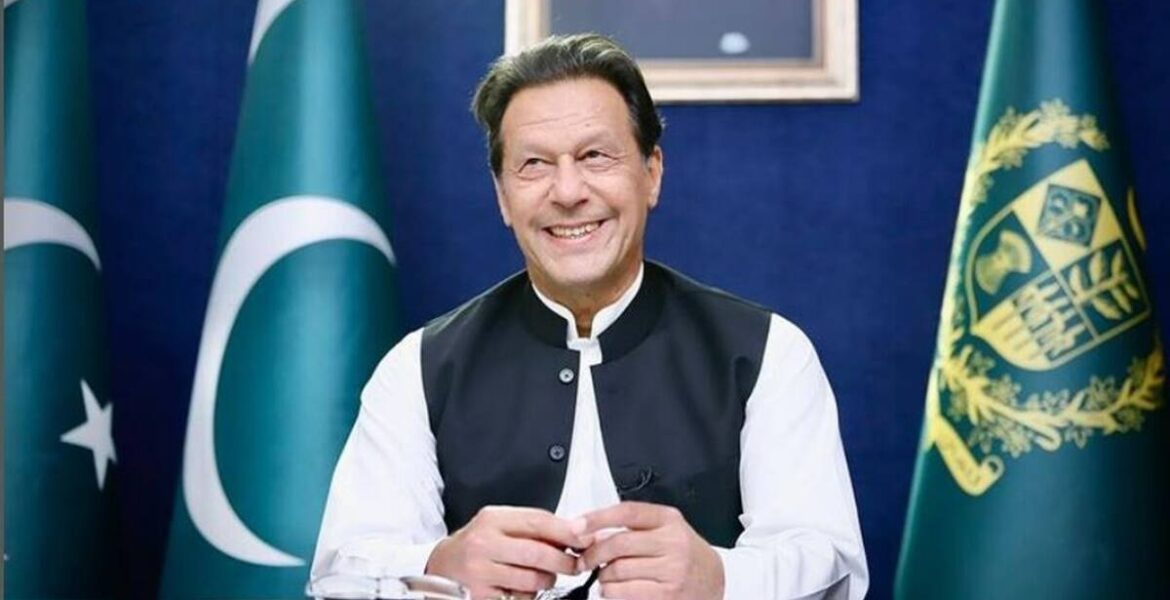Pakistan's jailed former Prime Minister Imran Khan on (October 19, 2023), said that he was "open for dialogue" and "ready to talk," indicating his willingness to mend ties with the powerful establishment ahead of next month's general elections. The 71-year-old founder of the Pakistan Tehreek-e-Insaaf (PTI) party has been incarcerated at a high-security jail facing multiple cases for more than six months. The nomination papers of Khan and his party leaders have been rejected by the Election Commission of Pakistan (ECP). Various courts have been turning down his and his party's pleas against these decisions clearly demonstrating the power of the Pakistan Army to make or break the political landscape. Indications are that the deep state has decided to back former Prime Minister Nawaz Sharif and expects that he will be the next Pakistani PM.
That is the reason why Pakistan's military is using every trick to sideline the nation's most popular politician and the Pakistan Tehreek-e-Insaf (PTI) party. In recent months, thousands of PTI workers have been arrested, dozens of party leaders have resigned following lengthy interrogations, Imran Khan's name was banned from mainstream media, and constituency boundary lines were re-drawn to allegedly benefit his opponents. Former PM Imran Khan's own nomination papers have been rejected. He has already been convicted in the Toshakhana corruption case and is under trial for multiple other cases. It is ironic that in 2018, Imran Khan was the Army's favourite to knock out Nawaz Sharif and today it is the exact opposite. As Mohammed Taqi aptly states, the military deployed resources to organize his PTI and herded the army establishment-allied politicians to join him. The Army also got the Pak media to project Imran Khan as the nation's saviour and his opponents as vile and corrupt. The army even co-opted the judiciary to knock out Nawaz, to pave the way for Khan's installation.
While referring to the prevailing political landscape in the country, Imran Khan said that steps were being taken to form a "controlled parliament adding that his "biggest mistake was to accept a weak government. Instead of a weak government, I should have held elections again. It would be better to sit in the opposition rather than a weak coalition government." Given Imran's present predicaments, one wonders how he will spring a surprise, as he claims, with a Plan C on 8 February is beyond imagination. Imran opines that his plan would work, after the failure of Plan A and Plan B. Despite a protracted crackdown on his political party, a buoyant Khan made claims about the surprise 'Plan C' while speaking to reporters at the Adiala Jail in Rawalpindi. A day earlier, PTI chairman Gohar Ali Khan had told Dawn newspaper that "the said plan revolved around retaining the reserved seats of the party following the loss of their electoral symbol, 'bat'. 'Plan B' is ostensibly a deal the PTI signed with its splinter group, 'PTI-Nazriati', to contest polls under the 'batsman' symbol, which was thwarted by the Election Commission of Pakistan (ECP).
Imran Khan also demanded a live telecast of his jail trial "to let the nation understand what is happening in the court," The News International newspaper reported. The said that the party leadership knew that conspirators would spoil their plans, therefore, they had worked out alternative strategies. Khan claimed that a conspiracy was hatched against the PTI government, adding that about 10,000 workers of the party were put behind bars and efforts to dismantle the political party were also in full swing. Imran Khan also alleged, while talking about the cipher issue, that former army chief Qamar Javed Bajwa had offered him a two-thirds majority to keep quiet on the cipher issue and warned him of consequences if he tried to highlight the issue in public. The former PM said that Gen Bajwa had made the offer during meetings held at the President's House, provided he (Imran) would 'behave sensibly and would not underscore the cipher issue'.
Khan further claimed that his party was being targeted over 9 May violence and that the violent protests that targeted the Corps Commander's House and the GHQ of the Pakistan Army were a part of the 'London agreement.' Khan denied that the PTI was behind this mess, the Dawn report said. He then pointed the finger at a serving chief of the ISI's powerful Directorate C Major General Faisal Naseer, alleging that he had ordered a hit against him. Imran Khan targeted the incumbent COAS General Asim Munir first through innuendo, and finally by directly holding him responsible for his arrest. It is pertinent to recall that the ISI had held a highly unusual press conference in 2022, to fire salvos at Imran Khan. ISI chief Lt. Gen. Nadeem Anjum stated that Imran Khan had asked the then Army Chief Gen. Bajwa to do "illegal and unconstitutional acts". Given the antipathy the military developed towards Imran Khan it was but natural that they would do everything to unseat him and then defang his party.
There is another reason why the ISI made public its' angst against Imran Khan. This was because the latter had managed to divide the Army and it was necessary to present a united face to the people of Pakistan. Thus, one can see why the establishment in Pakistan is today so peeved with Imran Khan. This begs the question of how long Imran Khan will last or rather how long will the Army allow him to last? They could do a deal with him to go into exile, while continuing to pile cases against him. At this point, Imran Khan remains popular with the people of Pakistan and it is perhaps a question of timing as to when the military wants to get rid of Imran Khan.

